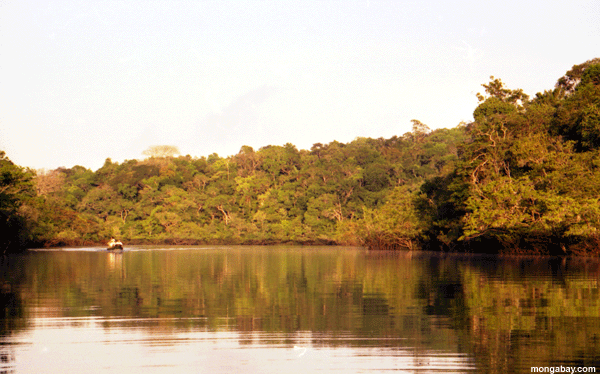|
|
|
|

|
The Manaus Declaration: 8 Countries Assert Sovereignty over the Amazon Rainforest
ENVIRONMENT-SOUTH AMERICA:
Amazonia Is Ours, Say Eight Countries
Original Article
Mario Osava
RIO DE JANEIRO, Sep 15 (IPS) - The sovereignty of the Amazon Basin countries over the natural resources of the region was roundly defended at a meeting of foreign ministers of the Amazon Cooperation Treaty Organisation (ACTO) member countries, in the northern Brazilian city of Manaus.
"Amazonia is ours," declared Brazilian Foreign Minister Celso Amorim, stressing that this statement was in no way an expression of xenophobia. The eight Amazon Basin countries, he said, are "sovereign guardians of a treasure that belongs to all of humankind" and have "the sovereign responsibility" to promote the sustainable development of the region.
"Sovereignty with responsibility" were the terms chosen by Peruvian Foreign Minister Manuel Rodr�guez, who spoke as host of the next meeting of ACTO ministers, scheduled for September 2005 in Iquitos, in northern Peru.
Amorim underscored security as a "fundamental issue" for the region and one of the primary goals of the Treaty, signed in 1978 by Bolivia, Brazil, Colombia, Ecuador, Guyana, Peru, Surinam and Venezuela, the countries that share this region of enormous biological wealth.
In his opening remarks at Tuesday's meeting, Amorim noted that in addition to the protection of borders, the Amazon countries must also contend with the constant threat of biopiracy -- the appropriation of the region's biological resources and traditional knowledge -- by multinational firms.
The Amazon region is the source of many of the biological resources used to develop and patent new drugs, yet the patent holders fail to acknowledge the indigenous peoples whose traditional knowledge gave rise to these products, the minister said.
The Manaus Declaration, signed by the ministers at Tuesday's meeting, underlines their determination to "fight biopiracy and ensure the full exercise of the sovereign rights of the Amazon countries over the resources of the region's biological diversity."
The declaration also reflects the need to guarantee the peoples of the Amazon region "a fair and equitable share of the economic benefits that result from sustainable commercial use of traditional knowledge."
Other commitments established in the declaration include curbing deforestation and illegal forestry activities, promoting investment and trade in goods and services among the eight countries, jointly developing common positions at international forums that have an impact on Amazonia, and contributing to the "gradual formation of a South American Community of Nations."
In order to protect and develop the Amazon jungle region, it is crucial to cooperate and share information gathered through remote monitoring systems, the ministers agreed.
Amorim underlined Brazil's willingness to share its experience and results from the Amazon Vigilance and Protection System. Developed over the course of several years, the system comprises radar sensors, monitoring planes and computer networks for data gathering and airspace security.
Brazil has already offered this cooperation to a number of the region's countries through bilateral agreements.
The enormous potential of the Amazon region was highlighted by Rosal�a Arteaga, former president of Ecuador and secretary-general of ACTO since May.
The region covers a vast area of 7.5 million square kilometres, encompassing eight countries and some 30 million inhabitants.
It is home to half of the planet's biological diversity, 20 percent of its freshwater flow, and over 2,000 species of plants already identified for medicinal, dietary or industrial use, Arteaga noted.
This "fabulous biodiversity" could have much greater economic and social benefits when combined with technological advances, she said.
Arteaga also spoke of the need for financial resources to gain deeper knowledge of the region's natural wealth and promote its sustainable development.
She called for the establishment of "systems through which the developed countries pay the Amazon peoples for the environmental services provided," and for acknowledgement of "the world's ethical debt to Amazonia."
These "environmental services" include the protection of the Earth's greatest concentration of biological wealth and the Amazon rainforest's role in maintaining climatic stability far beyond the borders of South America, by serving as the "lungs" of the planet.
The foreign ministers also adopted a Strategic Plan outlining the actions to be undertaken by ACTO up through the year 2012. The plan establishes four strategic themes, six priority areas of action, and the instruments needed to meet these objectives.
The foreign ministers' meeting is followed by the 2nd Amazon International Fair, taking place Sep. 15-18. Aimed at promoting business in the region, it will include a seminar on cooperation and economic integration.
Running parallel to the fair is the Brazil-Venezuela Forum, in which more than 100 Venezuelan business representatives are participating. Brazilian President Luiz Inacio Lula da Silva and Venezuelan President Hugo Ch�vez met Wednesday in Manaus. (END/2004)
CONTENT COPYRIGHT Independent Digital (UK) Ltd. THIS CONTENT IS INTENDED SOLELY FOR EDUCATIONAL PURPOSES.
mongabay.com users agree to the following as a condition for use of this material:
This site contains copyrighted material the use of which has not always been authorized by the copyright owner. Such material is made available in an effort to advance understanding of environmental issues. This constitutes 'fair use' of any such copyrighted material as provided for in section 107 of the US Copyright Law. In accordance with Title 17 U.S.C. Section 107, the material on this site is distributed without profit. If you wish to use copyrighted material from this site for purposes of your own that go beyond 'fair use', you must obtain permission from the copyright owner.
If you are the copyright owner and would like this content removed from mongabay.com, please contact me.
|